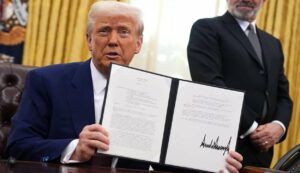
WASHINGTON: As he readied himself for talks with certain countries, President Donald Trump’s “reciprocal” tariffs on dozens of countries, including hefty 104% penalties on Chinese imports, went into force on Wednesday, April 9.

Trump’s punitive tariffs have caused a significant decline in global equities, shattered a decades-old global trade system, and sparked recessionary worries.
Since Trump announced the tariffs a week ago, the S&P 500 has lost about US$6 trillion in value, the worst four-day decline since the benchmark’s inception in the 1950s. The index is now 20% below its most recent high, which is considered a bear market.
After a short break, a sell-off in Asian markets continued on Wednesday, with South Korea’s won currency plunging to a level not seen in almost 16 years and Japan’s Nikkei down more than 3%.
Additionally, U.S. stock futures indicated that Wall Street would lose for the fifth day in a row.
Trump has sent conflicting signals to investors about the long-term viability of the tariffs, calling them “permanent” but yet bragging that they are putting pressure on other leaders to engage in talks.
He said, “We have a lot of countries coming in that want to make deals,” during a Tuesday afternoon gathering at the White House. At a subsequent occasion, he said that he anticipated China would also seek an accord.
Italian Prime Minister Giorgia Meloni is expected to visit next week, and Trump’s administration has planned meetings with two important friends and significant commercial partners, South Korea and Japan.
Later on Wednesday, Trump’s Treasury Secretary Scott Bessent will speak with the deputy prime minister of Vietnam, the low-cost Asian manufacturing centre that has been smacked with some of the highest levies in the world.
Stock markets had risen early Tuesday due to the possibility of agreements with other nations, but by the conclusion of the trading day, US equities had lost their gains.
In reaction to counter-tariffs proposed by Beijing last week, Trump almost doubled levies on Chinese imports, which were previously set at 54%. China has pledged to oppose anything it considers to be blackmail.
In reaction to the instability caused by tariffs, leading Chinese brokerages have promised to cooperate in order to assist stabilise local share markets.
Economists have cautioned that the trade war would probably result in increased costs for US consumers on everything from wine to trainers.
Since any items that are in transit as of midnight will be immune from the new duties as long as they arrive in the US by May 27, the full impact of Wednesday’s tariffs could not be seen for a while.
According to a recent Reuters-Ipsos survey, over three-quarters of Americans anticipate price increases for commonplace goods during the next six months.
Last Saturday marked the start of Trump’s previous general 10% tariffs on all imports from several nations. Trump claims that nations who are “ripping off” the US are the target of the most recent round of penalties, which went into effect at 12.01 a.m. Eastern Time (4.01 a.m. GMT).
Many of the closest allies of the United States are on that list, including the European Union, which was subject to a 20% tax.
According to Trump, the tariffs are a reaction to restrictions placed on US imports that have hindered American companies. Tokyo disputes his accusations that nations, including Japan, devalue their currencies in order to get a trade advantage.
Foreign currency rates may be discussed in trade talks with Washington, according to Japan’s finance minister on Wednesday.
Trump hinted that he may not be done enacting tariffs.
He claimed he will soon impose “major” tariffs on pharmaceutical imports, one of the only products that have been spared from the new duties, during comments to Republican legislators Tuesday night.